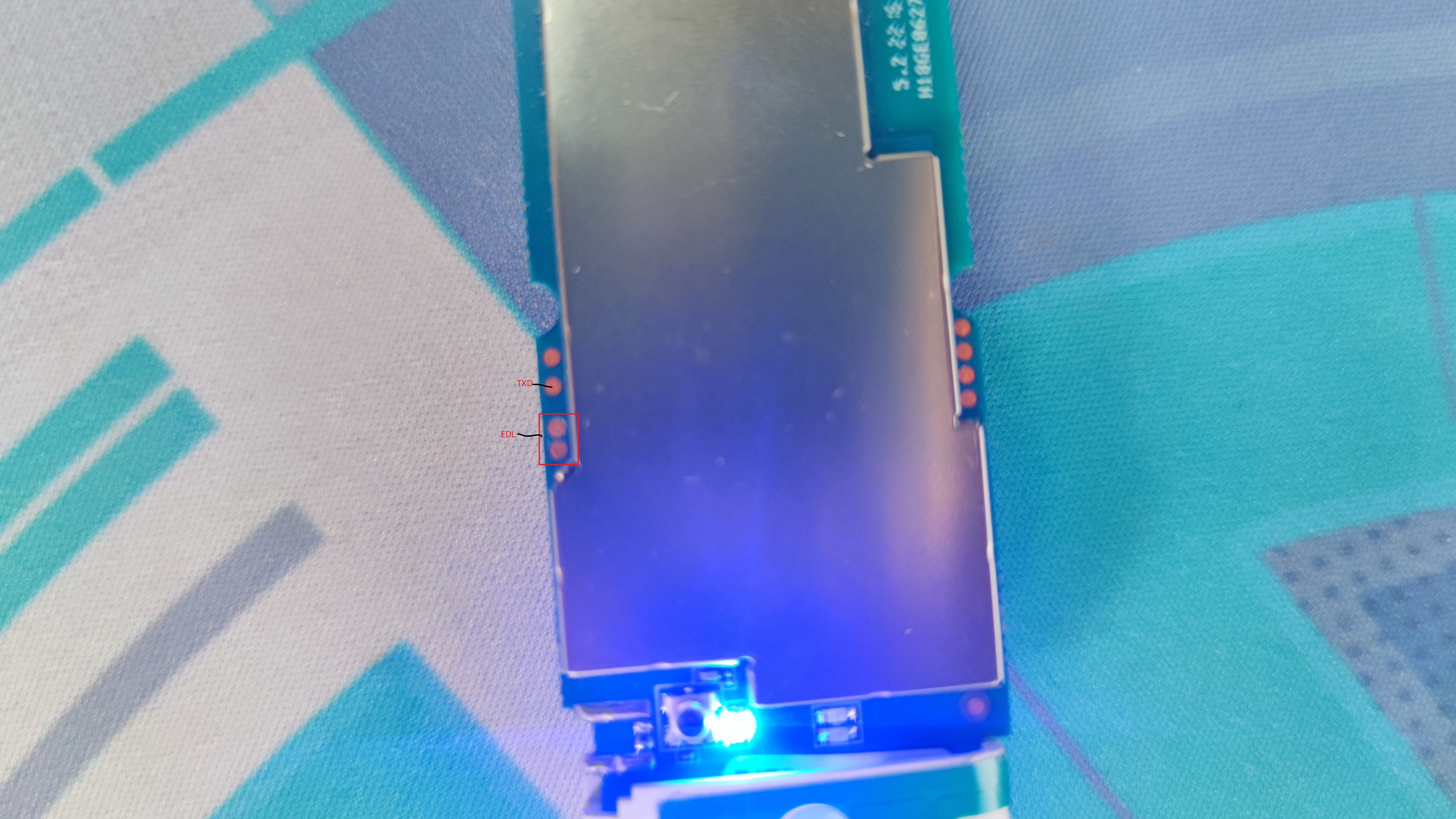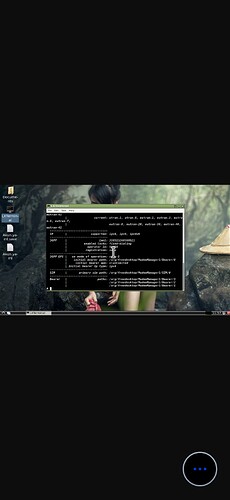lte connection drops after approximatly five minutes
does anybody have a hint? This happens regardless whether I configure the connection using /etc/config/network or by invoking mmcli -m 0 --simple-connect=..... It is also annoying that ifconfig always shows zero transferred bytes even if something has been downloaded. The last messages from logread with "mmcli -G DEBUG" are
Tue Mar 21 07:27:15 2023 daemon.debug [2789]: [/dev/rpmsg0] Received generic indication (translated)... <<<<<< QMUX: <<<<<< length = 16 <<<<<< flags = 0x80 <<<<<< service = "wds" <<<<<< client = 2 <<<<<< QMI: <<<<<< flags = "indication" <<<<<< transaction = 40 <<<<<< tlv_length = 4 <<<<<< message = "Event Report" (0x0001) <<<<<< TLV: <<<<<< type = "Dormancy Status" (0x18) <<<<<< length = 1 <<<<<< value = 01 <<<<<< translated = traffic-channel-dormant
Tue Mar 21 07:27:15 2023 daemon.debug [2789]: <debug> [modem0/bearer1] got QMI WDS event report
Tue Mar 21 07:27:24 2023 daemon.debug [2789]: [/dev/rpmsg0] Received message... <<<<<< RAW: <<<<<< length = 29 <<<<<< data = 01:1C:00:80:01:02:04:29:00:01:00:10:00:28:04:00:04:00:00:00:22:02:00:01:00:1F:01:00:02
Tue Mar 21 07:27:24 2023 daemon.debug [2789]: [/dev/rpmsg0] Received generic indication (translated)... <<<<<< QMUX: <<<<<< length = 28 <<<<<< flags = 0x80 <<<<<< service = "wds" <<<<<< client = 2 <<<<<< QMI: <<<<<< flags = "indication" <<<<<< transaction = 41 <<<<<< tlv_length = 16 <<<<<< message = "Event Report" (0x0001) <<<<<< TLV: <<<<<< type = "Data Call Address Family" (0x28) <<<<<< length = 4 <<<<<< value = 04:00:00:00 <<<<<< translated = ipv4 <<<<<< TLV: <<<<<< type = "Data Call Type" (0x22) <<<<<< length = 2 <<<<<< value = 01:00 <<<<<< translated = [ data_call_type = 'embedded' tethered_call_type = 'non-tethered' ] <<<<<< TLV: <<<<<< type = "Data Call Status" (0x1f) <<<<<< length = 1 <<<<<< value = 02 <<<<<< translated = terminated
Tue Mar 21 07:27:24 2023 daemon.debug [2789]: [/dev/rpmsg0] Received message... <<<<<< RAW: <<<<<< length = 34 <<<<<< data = 01:21:00:80:01:02:04:2A:00:22:00:15:00:01:02:00:01:00:10:02:00:01:00:11:04:00:00:00:00:00:12:01:00:04
Tue Mar 21 07:27:24 2023 daemon.debug [2789]: [/dev/rpmsg0] Received generic indication (translated)... <<<<<< QMUX: <<<<<< length = 33 <<<<<< flags = 0x80 <<<<<< service = "wds" <<<<<< client = 2 <<<<<< QMI: <<<<<< flags = "indication" <<<<<< transaction = 42 <<<<<< tlv_length = 21 <<<<<< message = "Packet Service Status" (0x0022) <<<<<< TLV: <<<<<< type = "Connection Status" (0x01) <<<<<< length = 2 <<<<<< value = 01:00 <<<<<< translated = [ status = 'disconnected' reconfiguration_required = 'no' ] <<<<<< TLV: <<<<<< type = "Call End Reason" (0x10) <<<<<< length = 2 <<<<<< value = 01:00 <<<<<< translated = generic-unspecified <<<<<< TLV: <<<<<< type = "Verbose Call End Reason" (0x11) <<<<<< length = 4 <<<<<< value = 00:00:00:00 <<<<<< translated = [ type = '(null)' reason = '0' ] <<<<<< TLV: <<<<<< type = "IP Family" (0x12) <<<<<< length = 1 <<<<<< value = 04 <<<<<< translated = ipv4
Tue Mar 21 07:27:24 2023 daemon.debug [2789]: [/dev/rpmsg0] Received message... <<<<<< RAW: <<<<<< length = 34 <<<<<< data = 01:21:00:80:01:01:04:04:00:22:00:15:00:01:02:00:01:00:10:02:00:01:00:11:04:00:00:00:00:00:12:01:00:04
Tue Mar 21 07:27:24 2023 daemon.debug [2789]: [/dev/rpmsg0] Received generic indication (translated)... <<<<<< QMUX: <<<<<< length = 33 <<<<<< flags = 0x80 <<<<<< service = "wds" <<<<<< client = 1 <<<<<< QMI: <<<<<< flags = "indication" <<<<<< transaction = 4 <<<<<< tlv_length = 21 <<<<<< message = "Packet Service Status" (0x0022) <<<<<< TLV: <<<<<< type = "Connection Status" (0x01) <<<<<< length = 2 <<<<<< value = 01:00 <<<<<< translated = [ status = 'disconnected' reconfiguration_required = 'no' ] <<<<<< TLV: <<<<<< type = "Call End Reason" (0x10) <<<<<< length = 2 <<<<<< value = 01:00 <<<<<< translated = generic-unspecified <<<<<< TLV: <<<<<< type = "Verbose Call End Reason" (0x11) <<<<<< length = 4 <<<<<< value = 00:00:00:00 <<<<<< translated = [ type = '(null)' reason = '0' ] <<<<<< TLV: <<<<<< type = "IP Family" (0x12) <<<<<< length = 1 <<<<<< value = 04 <<<<<< translated = ipv4
Tue Mar 21 07:27:24 2023 daemon.debug [2789]: <debug> [modem0/bearer1] got QMI WDS event report
Tue Mar 21 07:27:24 2023 daemon.info [2789]: <info> [modem0/bearer1] verbose call end reason (0,0): [(null)] (null)
Tue Mar 21 07:27:24 2023 daemon.debug [2789]: [/dev/rpmsg0] Sent message... <<<<<< RAW: <<<<<< length = 61 <<<<<< data = 01:3C:00:00:01:02:00:0E:00:01:00:30:00:1E:01:00:00:1C:01:00:00:1B:01:00:00:1A:01:00:00:19:01:00:00:18:01:00:00:17:01:00:00:15:01:00:00:14:01:00:00:13:01:00:00:12:01:00:00:10:01:00:00
Tue Mar 21 07:27:24 2023 daemon.debug [2789]: [/dev/rpmsg0] Sent generic request (translated)... <<<<<< QMUX: <<<<<< length = 60 <<<<<< flags = 0x00 <<<<<< service = "wds" <<<<<< client = 2 <<<<<< QMI: <<<<<< flags = "none" <<<<<< transaction = 14 <<<<<< tlv_length = 48 <<<<<< message = "Set Event Report" (0x0001) <<<<<< TLV: <<<<<< type = "Extended Data Bearer Technology" (0x1e) <<<<<< length = 1 <<<<<< value = 00 <<<<<< translated = no <<<<<< TLV: <<<<<< type = "Limited Data System Status" (0x1c) <<<<<< length = 1 <<<<<< value = 00 <<<<<< translated = no <<<<<< TLV: <<<<<< type = "Uplink Flow Control" (0x1b) <<<<<< length = 1 <<<<<< value = 00 <<<<<< translated = no <<<<<< TLV: <<<<<< type = "Data Systems" (0x1a) <<<<<< length = 1 <<<<<< value = 00 <<<<<< translated = no <<<<<< TLV: <<<<<< type = "EVDO PM Change" (0x19) <<<<<< length = 1 <<<<<< value = 00 <<<<<< translated = no <<
Tue Mar 21 07:27:24 2023 daemon.debug [2789]: <debug> [modem0/wwan0/net] port now disconnected
Tue Mar 21 07:27:24 2023 daemon.info [2789]: <info> [modem0] state changed (connected -> registered)
Tue Mar 21 07:27:24 2023 daemon.info [2789]: <info> [modem0/bearer1] connection #1 finished: duration 266s, tx: 4916 bytes, rx: 700 bytes
Tue Mar 21 07:27:24 2023 daemon.debug [2789]: [/dev/rpmsg0] Received message... <<<<<< RAW: <<<<<< length = 36 <<<<<< data = 01:23:00:80:01:02:04:2B:00:01:00:17:00:24:14:00:00:02:00:00:80:00:00:00:00:00:00:01:00:00:00:00:00:00:00:00
Tue Mar 21 07:27:24 2023 daemon.debug [2789]: [/dev/rpmsg0] Received generic indication (translated)... <<<<<< QMUX: <<<<<< length = 35 <<<<<< flags = 0x80 <<<<<< service = "wds" <<<<<< client = 2 <<<<<< QMI: <<<<<< flags = "indication" <<<<<< transaction = 43 <<<<<< tlv_length = 23 <<<<<< message = "Event Report" (0x0001) <<<<<< TLV: <<<<<< type = "Data Systems" (0x24) <<<<<< length = 20 <<<<<< value = 00:02:00:00:80:00:00:00:00:00:00:01:00:00:00:00:00:00:00:00 <<<<<< translated = [ preferred_network_type = '3gpp' networks = '{ [0] = '[ network_type = '3gpp' rat_mask = '32768' so_mask = '0' ] ' [1] = '[ network_type = '3gpp2' rat_mask = '0' so_mask = '0' ] '}' ]
Tue Mar 21 07:27:24 2023 daemon.debug [2789]: [/dev/rpmsg0] Received message... <<<<<< RAW: <<<<<< length = 20 <<<<<< data = 01:13:00:80:01:02:04:2C:00:01:00:07:00:20:04:00:00:00:00:00
Tue Mar 21 07:27:24 2023 daemon.debug [2789]: [/dev/rpmsg0] Received generic indication (translated)... <<<<<< QMUX: <<<<<< length = 19 <<<<<< flags = 0x80 <<<<<< service = "wds" <<<<<< client = 2 <<<<<< QMI: <<<<<< flags = "indication" <<<<<< transaction = 44 <<<<<< tlv_length = 7 <<<<<< message = "Event Report" (0x0001) <<<<<< TLV: <<<<<< type = "Preferred Data System" (0x20) <<<<<< length = 4 <<<<<< value = 00:00:00:00 <<<<<< translated = unknown
Tue Mar 21 07:27:24 2023 daemon.debug [2789]: [/dev/rpmsg0] Received message... <<<<<< RAW: <<<<<< length = 36 <<<<<< data = 01:23:00:80:01:01:04:05:00:01:00:17:00:24:14:00:00:02:00:00:80:00:00:00:00:00:00:01:00:00:00:00:00:00:00:00
Tue Mar 21 07:27:24 2023 daemon.debug [2789]: [/dev/rpmsg0] Received generic indication (translated)... <<<<<< QMUX: <<<<<< length = 35 <<<<<< flags = 0x80 <<<<<< service = "wds" <<<<<< client = 1 <<<<<< QMI: <<<<<< flags = "indication" <<<<<< transaction = 5 <<<<<< tlv_length = 23 <<<<<< message = "Event Report" (0x0001) <<<<<< TLV: <<<<<< type = "Data Systems" (0x24) <<<<<< length = 20 <<<<<< value = 00:02:00:00:80:00:00:00:00:00:00:01:00:00:00:00:00:00:00:00 <<<<<< translated = [ preferred_network_type = '3gpp' networks = '{ [0] = '[ network_type = '3gpp' rat_mask = '32768' so_mask = '0' ] ' [1] = '[ network_type = '3gpp2' rat_mask = '0' so_mask = '0' ] '}' ]
Tue Mar 21 07:27:24 2023 daemon.debug [2789]: [/dev/rpmsg0] Received message... <<<<<< RAW: <<<<<< length = 20 <<<<<< data = 01:13:00:80:01:02:02:0E:00:01:00:07:00:02:04:00:00:00:00:00
Tue Mar 21 07:27:24 2023 daemon.debug [2789]: [/dev/rpmsg0] Received generic response (translated)... <<<<<< QMUX: <<<<<< length = 19 <<<<<< flags = 0x80 <<<<<< service = "wds" <<<<<< client = 2 <<<<<< QMI: <<<<<< flags = "response" <<<<<< transaction = 14 <<<<<< tlv_length = 7 <<<<<< message = "Set Event Report" (0x0001) <<<<<< TLV: <<<<<< type = "Result" (0x02) <<<<<< length = 4 <<<<<< value = 00:00:00:00 <<<<<< translated = SUCCESS
Tue Mar 21 07:27:24 2023 daemon.debug [2789]: <debug> [modem0] data systems update, preferred network: 3gpp
Tue Mar 21 07:27:24 2023 daemon.debug [2789]: [/dev/rpmsg0] Sent message... <<<<<< RAW: <<<<<< length = 13 <<<<<< data = 01:0C:00:00:01:01:00:0A:00:85:00:00:00
Tue Mar 21 07:27:24 2023 daemon.debug [2789]: [/dev/rpmsg0] Sent generic request (translated)... <<<<<< QMUX: <<<<<< length = 12 <<<<<< flags = 0x00 <<<<<< service = "wds" <<<<<< client = 1 <<<<<< QMI: <<<<<< flags = "none" <<<<<< transaction = 10 <<<<<< tlv_length = 0 <<<<<< message = "Get LTE Attach Parameters" (0x0085)
Tue Mar 21 07:27:24 2023 daemon.debug [2789]: [/dev/rpmsg0] Received message... <<<<<< RAW: <<<<<< length = 20 <<<<<< data = 01:13:00:80:01:01:02:0A:00:85:00:07:00:02:04:00:01:00:4A:00
Tue Mar 21 07:27:24 2023 daemon.debug [2789]: [/dev/rpmsg0] Received generic response (translated)... <<<<<< QMUX: <<<<<< length = 19 <<<<<< flags = 0x80 <<<<<< service = "wds" <<<<<< client = 1 <<<<<< QMI: <<<<<< flags = "response" <<<<<< transaction = 10 <<<<<< tlv_length = 7 <<<<<< message = "Get LTE Attach Parameters" (0x0085) <<<<<< TLV: <<<<<< type = "Result" (0x02) <<<<<< length = 4 <<<<<< value = 01:00:4A:00 <<<<<< translated = FAILURE: InformationUnavailable
Tue Mar 21 07:27:24 2023 daemon.debug [2789]: <debug> [modem0] couldn't load initial default bearer properties: Couldn't get LTE attach parameters: QMI protocol error (74): 'InformationUnavailable'
Tue Mar 21 07:27:40 2023 daemon.debug [2789]: [/dev/rpmsg0] Received message... <<<<<< RAW: <<<<<< length = 34 <<<<<< data = 01:21:00:80:03:01:04:08:00:24:00:15:00:01:06:00:00:02:01:00:01:00:11:01:00:00:22:05:00:00:02:00:00:00
Tue Mar 21 07:27:40 2023 daemon.debug [2789]: [/dev/rpmsg0] Received generic indication (translated)... <<<<<< QMUX: <<<<<< length = 33 <<<<<< flags = 0x80 <<<<<< service = "nas" <<<<<< client = 1 <<<<<< QMI: <<<<<< flags = "indication" <<<<<< transaction = 8 <<<<<< tlv_length = 21 <<<<<< message = "Serving System" (0x0024) <<<<<< TLV: <<<<<< type = "Serving System" (0x01) <<<<<< length = 6 <<<<<< value = 00:02:01:00:01:00 <<<<<< translated = [ registration_state = 'not-registered' cs_attach_state = 'detached' ps_attach_state = 'attached' selected_network = 'unknown' radio_interfaces = '{ [0] = 'none '}' ] <<<<<< TLV: <<<<<< type = "Data Service Capability" (0x11) <<<<<< length = 1 <<<<<< value = 00 <<<<<< translated = {} <<<<<< TLV: <<<<<< type = "Detailed Service Status" (0x22) <<<<<< length = 5 <<<<<< value = 00:02:00:00:00 <<<<<< translated = [ status = 'none' capability = 'ps' hdr_status = 'none' hdr_hybrid = 'no' forbidde
Tue Mar 21 07:27:40 2023 daemon.debug [2789]: <debug> [modem0] no 3GPP info given...
Tue Mar 21 07:27:40 2023 daemon.info [2789]: <info> [modem0] 3GPP registration state changed (home -> unknown)
Tue Mar 21 07:27:40 2023 daemon.debug [2789]: <debug> [modem0] consolidated registration state: cs 'unknown', ps 'unknown', eps 'unknown', 5gs 'unknown' --> 'unknown'
Tue Mar 21 07:27:40 2023 daemon.debug [2789]: <debug> [modem0] 3GPP location updated (MCCMNC: '<none>', location area code: 'FFFE', tracking area code: '008CE8', cell ID: '00EE2E1B')
Tue Mar 21 07:27:40 2023 daemon.debug [2789]: <debug> [modem0/bearer0] bearer not allowed to connect, not registered in 3GPP network
Tue Mar 21 07:27:40 2023 daemon.debug [2789]: <debug> [modem0/bearer1] bearer not allowed to connect, not registered in 3GPP network
Tue Mar 21 07:27:40 2023 daemon.info [2789]: <info> [modem0] state changed (registered -> enabled)
Tue Mar 21 07:27:40 2023 daemon.debug [2789]: <debug> [modem0] access technology changed (lte -> unknown)
Tue Mar 21 07:27:40 2023 daemon.debug [2789]: <debug> [modem0] 3GPP location updated (MCCMNC: '<none>', location area code: '0000', tracking area code: '000000', cell ID: '00000000')
Tue Mar 21 07:27:40 2023 daemon.warn [2789]: <warn> [modem0] couldn't load operator code: Current operator MCC/MNC is still unknown
Tue Mar 21 07:27:40 2023 daemon.warn [2789]: <warn> [modem0] couldn't load operator name: Current operator id is still unknown

